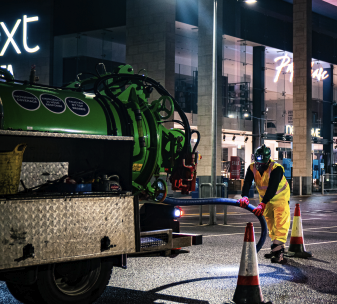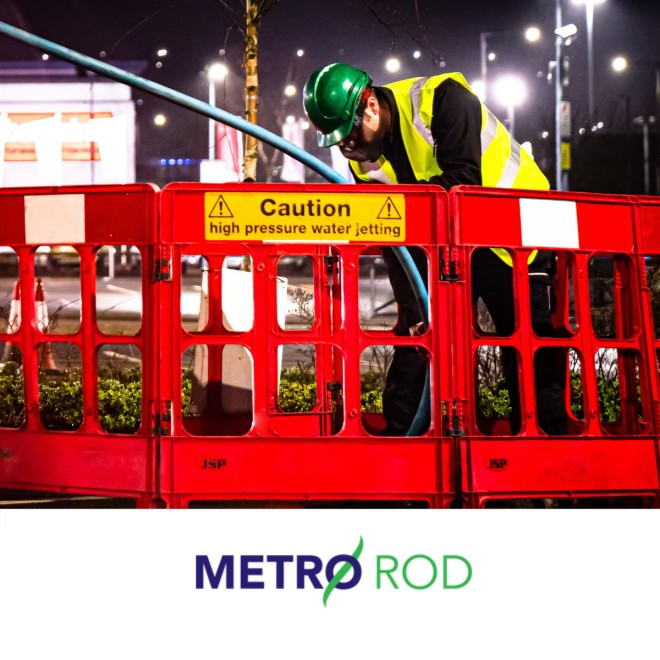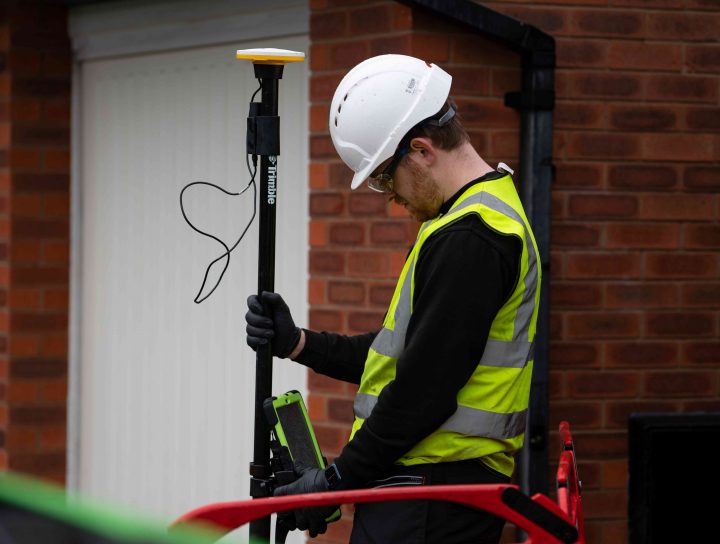Hydro Jetting, also known as high-pressure drain jetting, is an efficient drain cleaning method. Drain jetting utilises high-pressure water to remove stubborn blockages from the drainage system. Many blocked drains are due to substance build-ups, whether it’s debris, a build-up of fat, oil and grease or non-flushable items such as wet wipes that have been incorrectly flushed.
What Does Hydro Jetting Your Drains Involves?
Hydro jetting is performed by placing a high-pressure hose down the drain where the blockage lies. Using a self-contained jetting machine, water is pumped down the hose at high speed. The force in which the water is pumped is strong enough to break the blockage into smaller chunks and push it through the drain or sewer.
Hydro jetting is not only a fantastic drain unblocking technique but it’s also used during drain maintenance. Water jetting can be used to remove scale build-up and other residue, minimising the possibility of substance escalation causing future blockages.
Advantages of High-Pressure Drain Jetting
It’s essential to regularly maintain your drains to ensure they remain in pristine condition and prevent any unwanted problems from arising, such as faults, flaws, or drain blockages. Although hydro jet’s play a big part in drain maintenance, there are several other advantages to hydro jetting that you may not be aware of.
Clearing Large Drain Blockages
Of course, the most common advantage of hydro jets is that they can remove significant, stubborn blockages from the drainage system. Jetting hoses are made of synthetic rubber and are very flexible, enabling easy navigation through the drainage system to remove the blockage.
Drain Cleaning
High-pressure water jetting is also an excellent drain maintenance technique. Rather than just simply removing the blockage, hydro jets also clean the pipe. This is important because it reduces the amount of excess residue on the pipework, effectively minimising the likelihood of substance build-up in the future.
Environmental Benefits
Alternate drain unblocking methods use chemicals to clear debris build-up within the pipe. However, this isn’t always the best method to use as some chemicals can damage the internal pipework of your drain. Furthermore, those chemicals will harm the environment if they enter the drainage system.
Drain jetting uses pressurised water to remove the blockage therefore, it’s safer for the environment as it prevents chemicals from entering fresh water pipes. It’s important to note that prolonged water jetting in a single spot can damage some pipework materials due to the sheer force the water is projected at. High-pressure drain jetting is usually conducted between 2,000 and 4,000 psi. Therefore, if the pipe is made of concrete or clay, there is minor chance damage can be inflicted. However, brick and UPVC is much more fragile. Therefore, it’s essential to make sure the jetting hose keeps moving down the pipe.
It’s a Non-Invasive Technique
Although drain repair techniques, like patch repair or pipelining, are not forms of drain maintenance, they can be conducted simultaneously with hydro jetting to clear the drains of blockages before any repair work takes place.
Minor Root Removal
Tree roots are a common culprit for causing drainage issues. A high-pressure water jet can clear roots and any debris or waste caught by the roots. However, hydro jetting may not remove the blockage if the tree roots have been left to grow for an extended period. If this happens, specialist robotic cutting equipment will be required.
How Often Should You Clean Your Drains?
No drainage system is the same, so determining how often you should clean your drains is dependent on the frequency of use. For example, if the drainage system in question is connected to a manufacturing site that runs 24/7, it will require frequent maintenance whereas, a domestic house may only need maintenance on an annual or bi-annual basis. As a general rule of thumb, pre-planned drain maintenance should be carried out every six months to a year.
Contact Your Local Hydro Jetting Specialist
At Metro Rod, all our drainage engineers are qualified to the industry recognised Water Jetting Association in Safety Awareness and Drain and Sewer modules. This ensures that only the very best in the industry are on site to remove your drain blockage but also ensure that no harm comes to your pipework along the way.
If you suspect you have a clogged drain, contact Metro Rod. All our engineers are experts in high-pressure water jetting and are trained to the highest industry standards to ensure the best possible results from any job they undertake.
If you’re struggling with a blocked or slow running drain, click to find your local depot.

Talk to your local Metro Rod specialist
We are always happy to arrange a free site assessment and no obligation quotations for any work you might need. Alternatively, you can call our emergency hotline number on 0800 66 88 00
Get in touch Drainage Services
